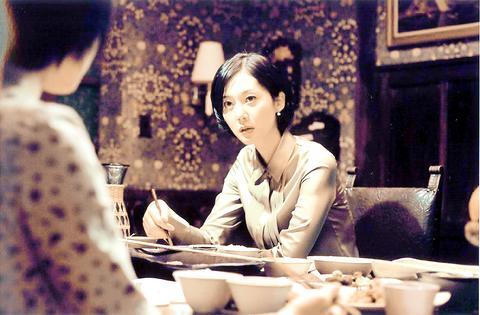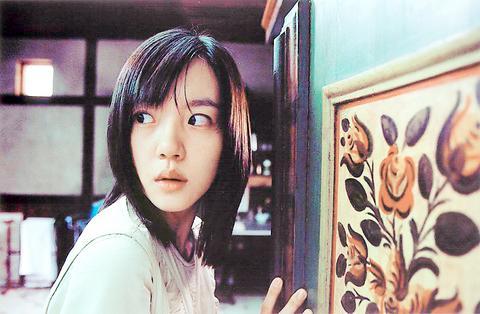Strictly speaking, A Tale of Two Sisters is more of a psycho-thriller than a horror or ghost film. After seeing the film, you cannot help but compare it with The Sixth Sense and The Others.
Director Kim Ji-woon was introduced to Taiwanese audience through his slightly violent comedy, The Foul King (2000), about a frustrated office worker who reveals a violent part of his personality through wrestling. Kim made his second appearance in Taiwan in the three-segment film Three (2002), a Korea-Thai-Hong Kong co-production. Kim directed the first segment Memory.
Those who found his previous efforts less than impressive, will be surprised by Kim's latest work, A Tale of Two Sisters.

PHOTO: FOX
Like Memory and Three, Two Sisters seeks to create a macabre and mysterious atmosphere. The narrative constantly plays mind games, and their are plenty of the usual bag of horror tricks. But this time, the story is richer and much less predictable. Even when you think you've solved the puzzle, new clues appear that entirely change the direction of the story.
Two Sisters tells the story of Su-mi (Lim Su-jeong) and Su-yeon (Mun Geun-yeong), two sisters from a rich family. After their father brings home a new partner, an icy, bewitching young woman (Yeom Jeong-ah), things at home start to go wrong. The girls' natural mother hangs herself in the big closet of the house. The older sister, Su-mi, is hospitalized as a result of excessive grief.
Back from the hospital, Su-mi starts a war against her step-mother. From acts of minor malice, the battle escalates to violence using hands, knives and boiling water. The step-mother is a former colleague of the girls' father and also used to care for their natural mother in hospital when working there as a nurse. These memories also emerge during the confrontation.

As the two sisters try to unravel the truth of their mother's death, the house becomes haunted by ghosts. Images such as floods of blood and a dead body wrapped in thick white cloth, keep rising on the screen. But you never know if these are hallucinations or real happenings. And who is the real ghost? The mother? The step-mother? Or the two sisters?
Director Kim Ji-woon has sought to differentiate his film from The Sixth Sense and The Others through new interpretations and new ways of handling the problems of the genre. "Horror films usually give key answers at the end of the film. But I tried to move ahead, revealing the answers by the middle of the film, but hopefully still keeping the audience interested until the end," Kim said.
For Kim, what is really horrifying is some memory that you want to forget but really cannot get rid off. Bad memories follow the main characters in the film like ghosts. "That is the point I wanted to make," he said.

Another plus is the eerie atmosphere created by the film's outstanding art design. The Korean title means "Roses and Lotuses," a reference to the names of the two girls. The walls of the house are decorated with complex floral patterns, which look classically graceful but also mysterious. On the other hand, the two girls wear simple, monochrome dresses. The lighting and make-up intensify the paleness of all the three women, making them both austere and fragile.
The result is a solid track record for this film. In Korea, the film sets a new box office record, taking 500 million won (US$424,126) in its first weekend. Remake rights have been purchased by DreamWorks for US$1 million.

Growing up in a rural, religious community in western Canada, Kyle McCarthy loved hockey, but once he came out at 19, he quit, convinced being openly gay and an active player was untenable. So the 32-year-old says he is “very surprised” by the runaway success of Heated Rivalry, a Canadian-made series about the romance between two closeted gay players in a sport that has historically made gay men feel unwelcome. Ben Baby, the 43-year-old commissioner of the Toronto Gay Hockey Association (TGHA), calls the success of the show — which has catapulted its young lead actors to stardom -- “shocking,” and says

The 2018 nine-in-one local elections were a wild ride that no one saw coming. Entering that year, the Chinese Nationalist Party (KMT) was demoralized and in disarray — and fearing an existential crisis. By the end of the year, the party was riding high and swept most of the country in a landslide, including toppling the Democratic Progressive Party (DPP) in their Kaohsiung stronghold. Could something like that happen again on the DPP side in this year’s nine-in-one elections? The short answer is not exactly; the conditions were very specific. However, it does illustrate how swiftly every assumption early in an

Inside an ordinary-looking townhouse on a narrow road in central Kaohsiung, Tsai A-li (蔡阿李) raised her three children alone for 15 years. As far as the children knew, their father was away working in the US. They were kept in the dark for as long as possible by their mother, for the truth was perhaps too sad and unjust for their young minds to bear. The family home of White Terror victim Ko Chi-hua (柯旗化) is now open to the public. Admission is free and it is just a short walk from the Kaohsiung train station. Walk two blocks south along Jhongshan

Francis William White, an Englishman who late in the 1860s served as Commissioner of the Imperial Customs Service in Tainan, published the tale of a jaunt he took one winter in 1868: A visit to the interior of south Formosa (1870). White’s journey took him into the mountains, where he mused on the difficult terrain and the ease with which his little group could be ambushed in the crags and dense vegetation. At one point he stays at the house of a local near a stream on the border of indigenous territory: “Their matchlocks, which were kept in excellent order,